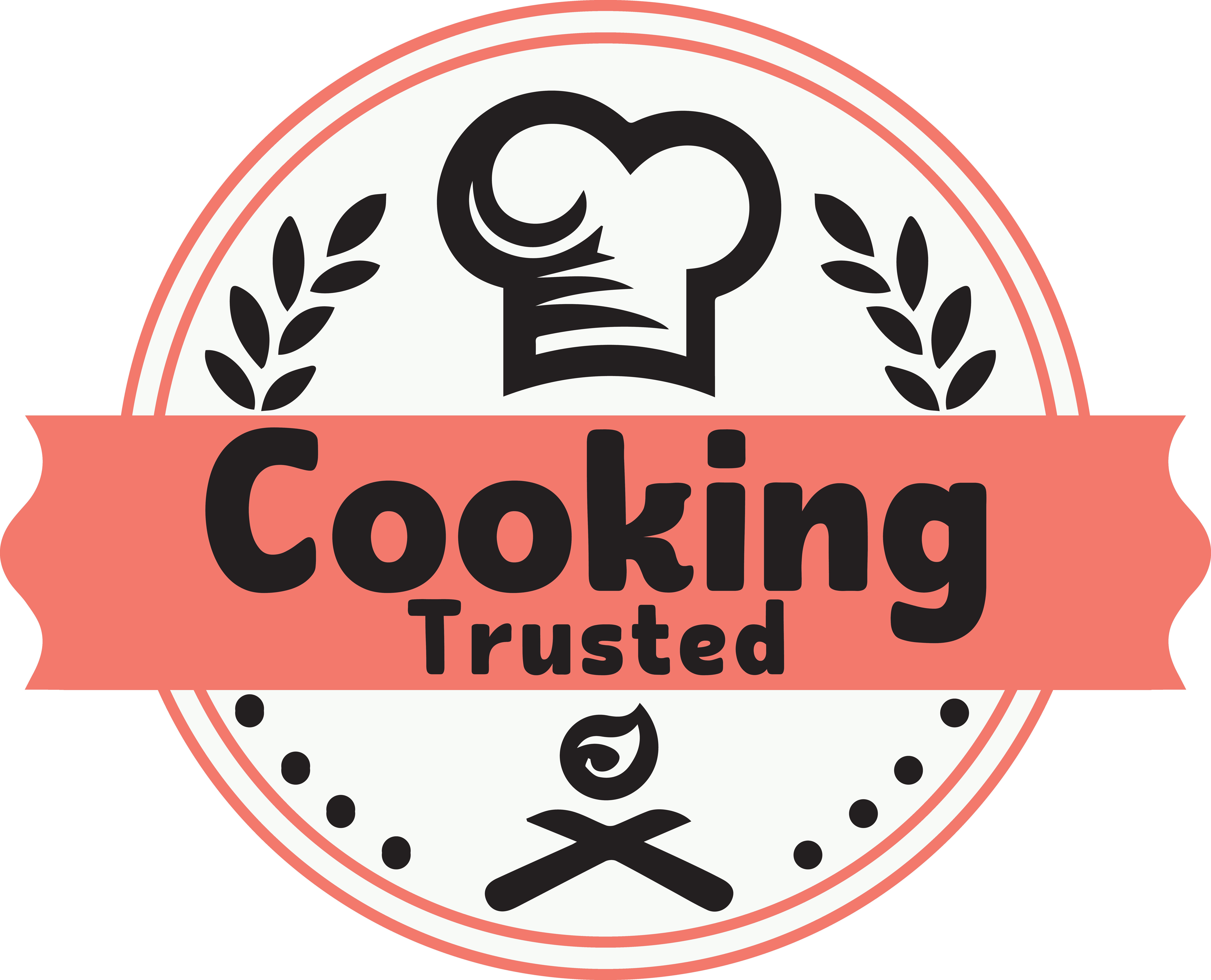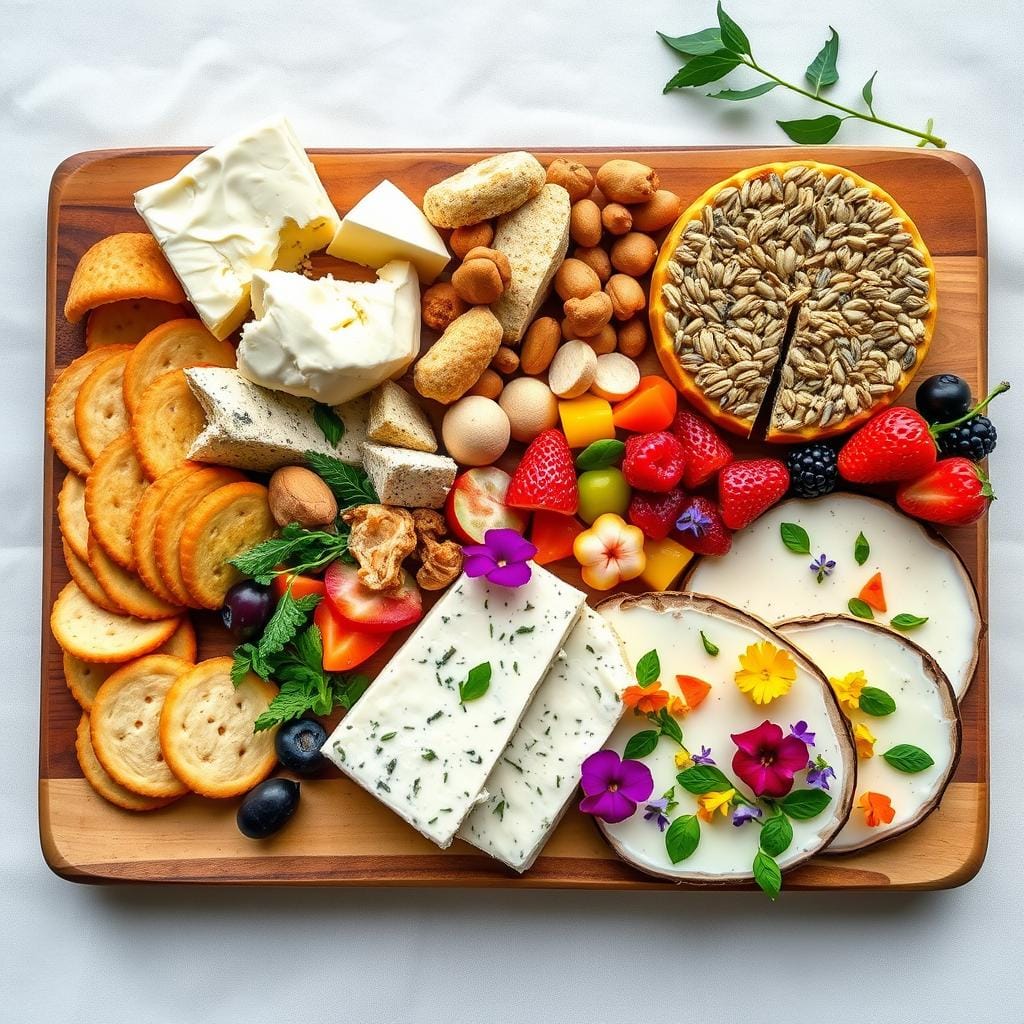Table of Contents
I remember the day I discovered vegan cheese could actually taste amazing. My first bite of dairy-free alternatives completely transformed my culinary world. Gone were the days of bland, rubbery substitutes – welcome to a delicious revolution of plant-based mozzarella and creamy cheese alternatives that satisfy every craving.
As someone passionate about both taste and health, I’ve explored countless vegan cheese recipes. These prove you don’t need dairy to experience rich, complex flavors. These dairy-free alternatives aren’t just replacements; they’re culinary experiences waiting to be savored.
Whether you’re lactose intolerant, following a plant-based diet, or simply curious about innovative cooking, this journey into vegan cheese will transform how you think about cheese forever.
Key Takeaways
- Discover delicious dairy-free cheese alternatives
- Learn how plant-based ingredients create authentic cheese experiences
- Explore nutritious and flavorful vegan cheese options
- Understand the versatility of homemade vegan cheese
- Embrace a healthier approach to cheese consumption
What is Plant-Based Cheese?
The vegan cheese market is growing fast. It’s expected to jump from $23.1 million in 2024 to $86.1 million by 2031. As someone who loves trying new foods, I’m excited to explore plant-based cheese.
Plant-based cheese is a new way to enjoy dairy-free foods. It’s made from plants and tastes like real cheese. It’s a great choice for those who want vegan options.
Understanding Dairy-Free Cheese Definition
Dairy-free cheese is made from plants and tastes like the real thing. It has the same texture and works like traditional cheese. The ingredients include:
- Nuts (cashews, almonds)
- Plant-based milk
- Nutritional yeast
- Tapioca starch
- Coconut oil
Common Vegan Cheese Ingredients
Plant-based cheese can be made in many ways. It often uses nuts like cashews, water, salt, and special cultures.
| Ingredient Category | Common Components | Typical Usage |
|---|---|---|
| Nut Base | Cashews, Almonds | Creamy texture |
| Binding Agents | Tapioca Starch, Agar | Consistency control |
| Flavor Enhancers | Nutritional Yeast | Cheese-like taste |
“Plant-based cheese isn’t just a trend—it’s a delicious revolution in food technology.” – Vegan Culinary Expert
More people are choosing plant-based cheese for health and environmental reasons. There are many types available, from spreads to melts. They meet different tastes and dietary needs.
Benefits of Choosing Plant-Based Cheese
Plant-based cheese opens up a world of health and environmental benefits. These dairy-free options are changing how we view nutrition and sustainable eating.
Health Advantages of Vegan Cheese
Vegan cheese has many health benefits. It’s different from traditional dairy cheese in several ways:
- Lower in saturated fat
- Cholesterol-free
- Suitable for lactose-intolerant individuals
- Often fortified with additional nutrients
More than 55% of people worldwide are looking for dairy alternatives that are good for them. Vegan cheese is a great choice for those watching their diet but wanting to enjoy tasty food.
Environmental Impact of Dairy-Free Cheese
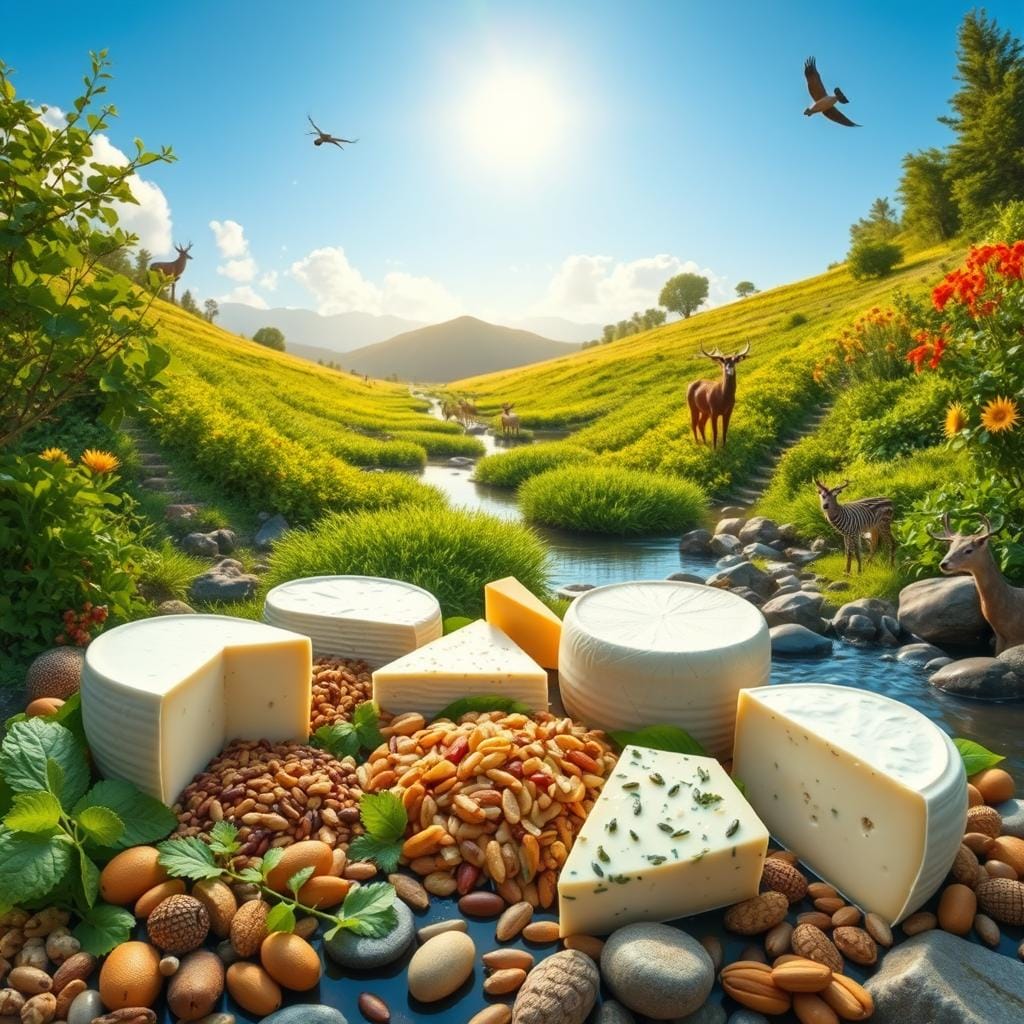
Dairy-free cheese is better for the environment than traditional dairy. It uses much less water and land.
| Resource | Dairy Cheese | Plant-Based Cheese |
|---|---|---|
| Water Usage | High | Significantly Lower |
| Land Requirement | Extensive | Minimal |
| Carbon Footprint | High | Reduced |
Choosing plant-based cheese helps reduce environmental harm. Every dairy-free cheese purchase is a vote for sustainable food systems.
“Sustainability isn’t just about the planet—it’s about creating healthier choices for ourselves and future generations.”
Vegan cheeses are now delicious and support both personal and planetary health. They are no longer just a compromise but a true culinary joy.
Popular Types of Plant-Based Cheese
The world of plant-based cheese has grown a lot. Now, we have many dairy-free cheese options. These choices are great for those who follow vegan diets.
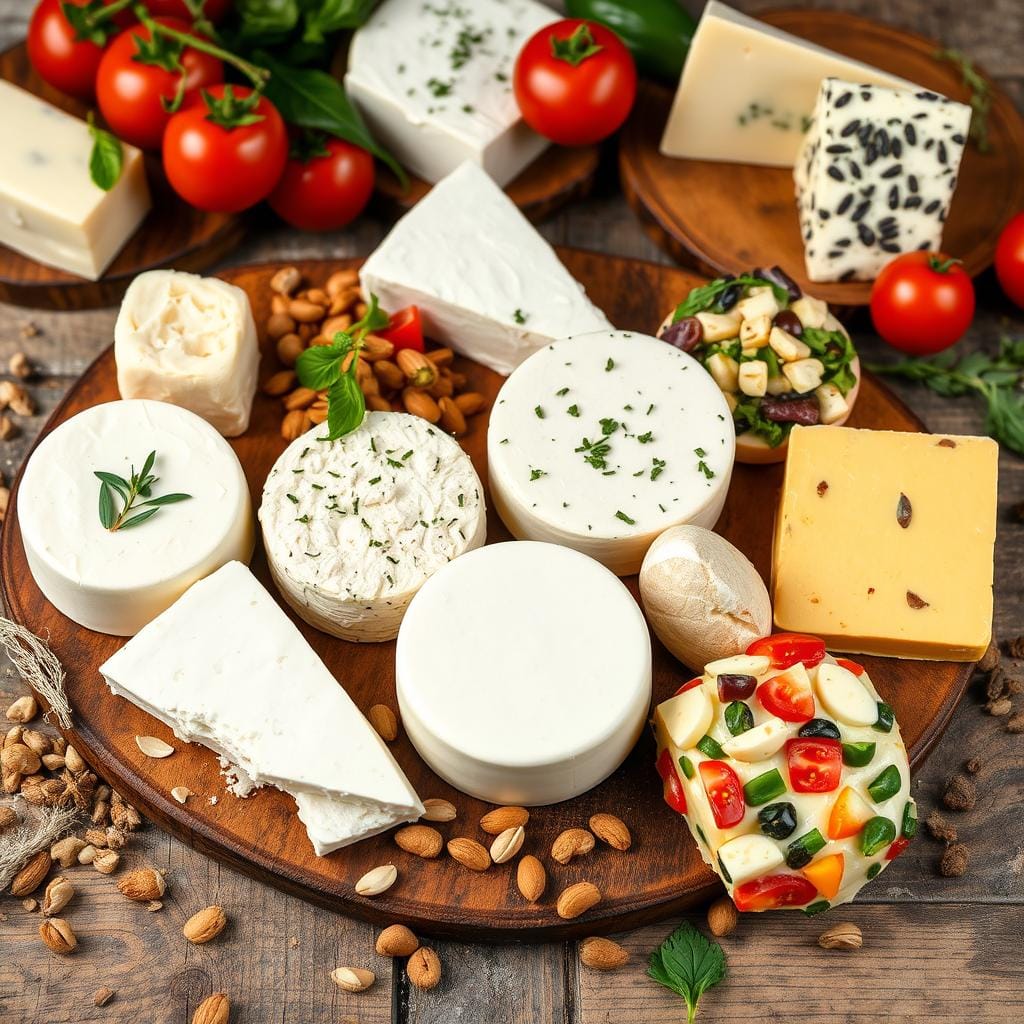
Plant-based cheese has changed a lot. It now offers tasty alternatives to traditional cheese. These options are good for your health and the planet.
Nut-Based Cheese Varieties
Nut-based cheeses are key in the dairy-free world. Cashew cheese and almond cheese are favorites for their creamy texture and taste. They are also good for you.
- Smooth, spreadable consistencies
- Rich, nuanced flavor profiles
- High nutritional value
- Adaptable for various culinary applications
Soy-Based Cheese Options
Soy-based vegan cheese is another big choice. It melts well and is full of protein. This makes it great for many dishes.
Cashew and Almond Cheese Innovations
Cashew cheese is loved for its gourmet taste. It can be made in many ways. Cheesemakers add special touches to make it even better.
“The future of cheese is plant-based, and it’s deliciously exciting!” – Vegan Culinary Expert
| Cheese Type | Key Characteristics | Best Uses |
|---|---|---|
| Cashew Cheese | Creamy, culturable | Spreads, sauces, cheese boards |
| Almond Cheese | Mild flavor, firm texture | Slicing, grating, sandwiches |
| Soy-Based Cheese | High protein, melts well | Pizza, grilled dishes |
When trying plant-based cheese, try different brands and types. You’ll find your favorite. Each one has its own special qualities that can make your food better.
How to Make Plant-Based Cheese at Home
Making vegan cheese at home is a fun cooking adventure. It lets you create tasty, dairy-free cheese in your kitchen. I love making cashew cheese because it’s easy and rewarding.
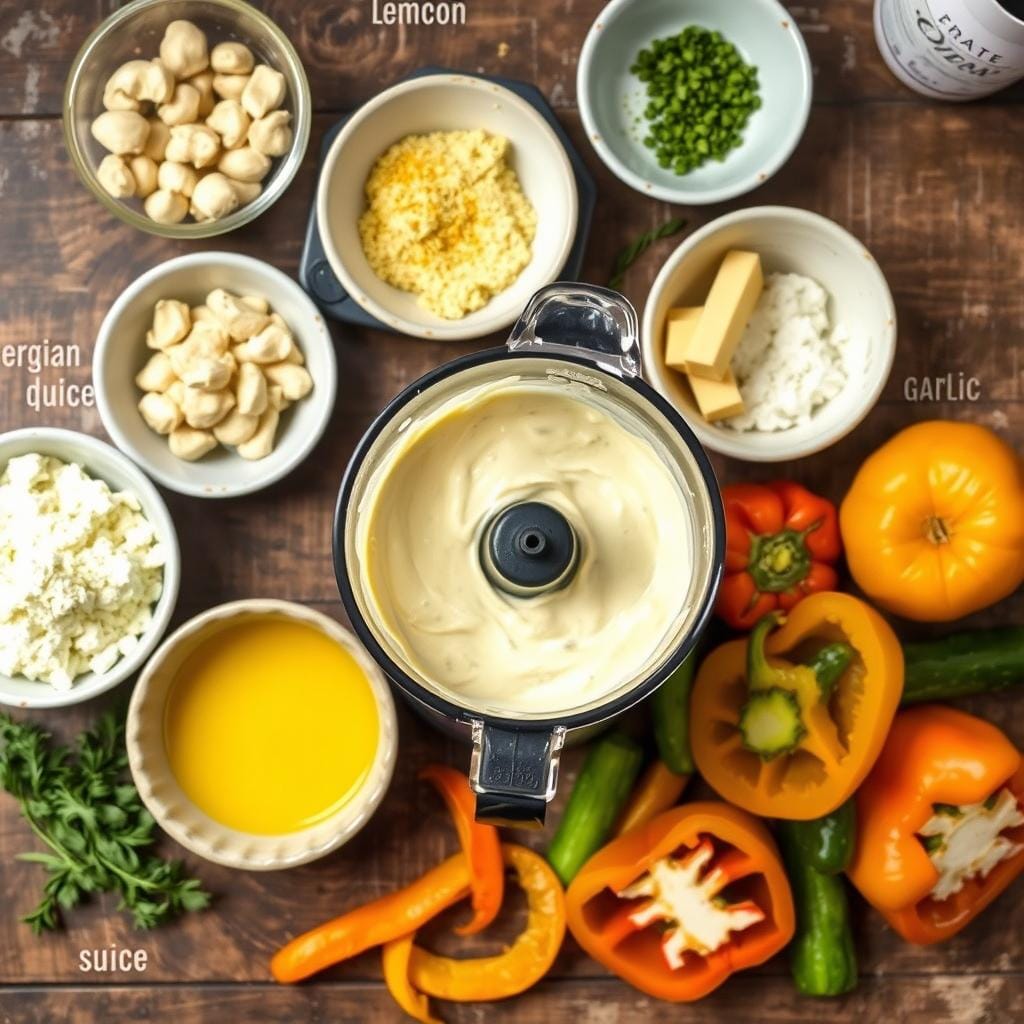
Essential Tools for Crafting Vegan Cheese
Before starting your vegan cheese project, you’ll need some basic tools:
- High-speed blender
- Cheesecloth
- Non-stick saucepan
- Airtight storage container
- Spatula
Step-by-Step Cashew Cheese Recipe
Here’s how to make a delicious cashew cheese that will wow dairy fans:
- Soak raw cashews for 4-6 hours
- Drain and rinse them well
- Blend cashews with plant-based milk
- Add nutritional yeast and seasonings
- Cook until it thickens
Pro Tips for Perfect Homemade Vegan Cheese
Here are some expert tips to make your vegan cheese even better:
| Tip | Description |
|---|---|
| Ingredient Quality | Choose fresh, high-quality raw cashews |
| Flavor Customization | Try different herbs and spices |
| Texture Control | Change the liquid amount for the right texture |
“The secret to great homemade vegan cheese is patience and creativity!” – Vegan Cooking Expert
My top tip for creamy cashew cheese is to add white vinegar and nutritional yeast. This mix gives a tangy, cheesy taste that’s amazing!
Flavor Profiles of Plant-Based Cheeses
Exploring vegan cheese flavors is a fun journey for food lovers. Plant-based cheese has grown a lot, giving us many tastes to try. These tastes challenge what we thought about dairy.
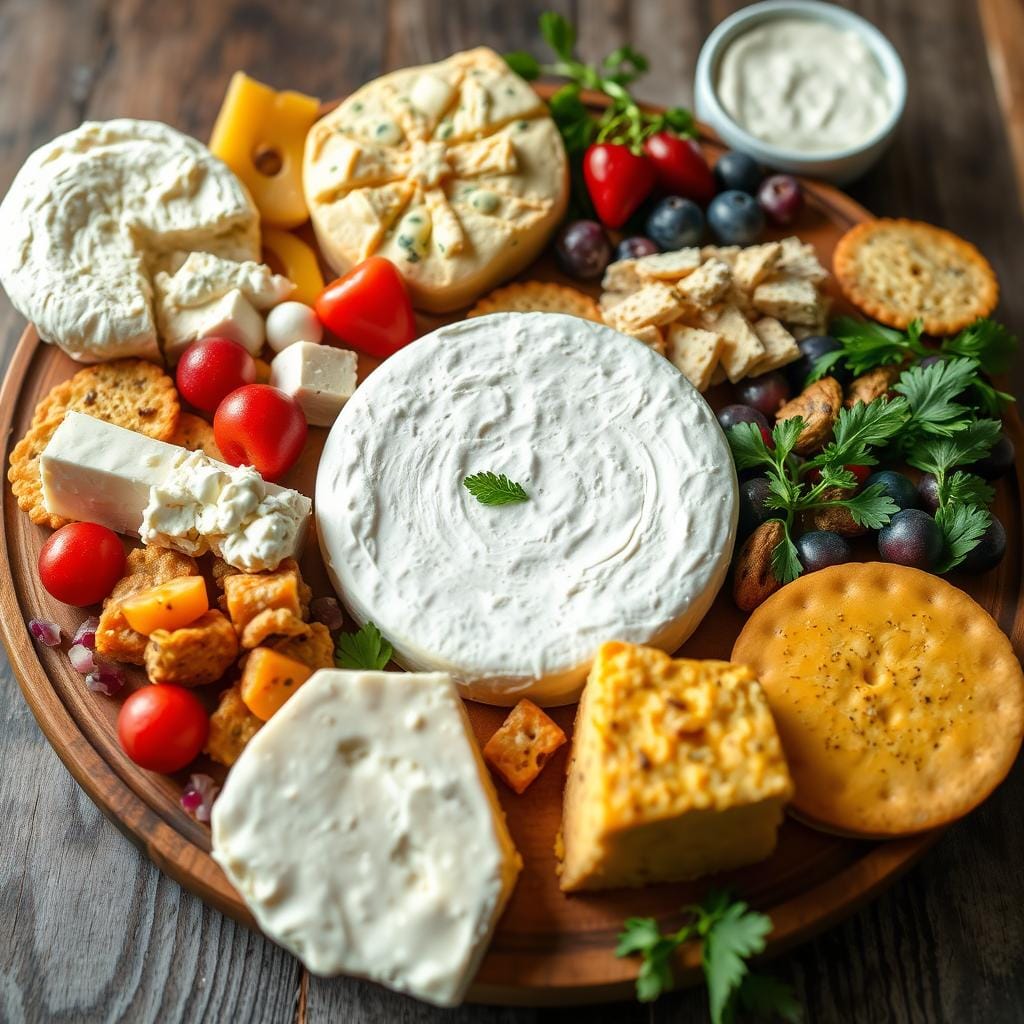
Vegan cheese comes in many flavors. You can find everything from creamy to tangy. There’s something for everyone.
Understanding Flavor Intensity
Vegan cheese flavors vary in intensity:
- Mild: Subtle, smooth cashew-based options
- Medium: Nutty and slightly complex profiles
- Strong: Sharp, intense flavors like aged dairy cheeses
Plant-Based Cheese Pairings
Finding the right pairings for vegan cheese can make your dishes better. I’ve found some great matches that highlight vegan cheese’s best qualities.
| Cheese Type | Recommended Pairings |
|---|---|
| Mild Cashew Cheese | Fresh fruits, light crackers, white wine |
| Sharp Aged-Style Vegan Cheese | Bold red wines, roasted nuts, dark bread |
| Herb-Infused Cheese | Grilled vegetables, olive tapenade, crisp salads |
Enjoying vegan cheese is all about trying new things. Mix different cheeses to find your favorite mix.
*Flavor is an adventure waiting to be explored, one plant-based bite at a time.*
Nutritional yeast, herbs, and fermentation have changed how we see plant-based cheese. They add depth and complexity, matching traditional dairy.
Plant-Based Cheese Spreads and Dips
Exploring vegan cheese spreads opens a world of flavors. Making dairy-free cheese dip at home is fun and easy. These alternatives are tasty and versatile for any dish.
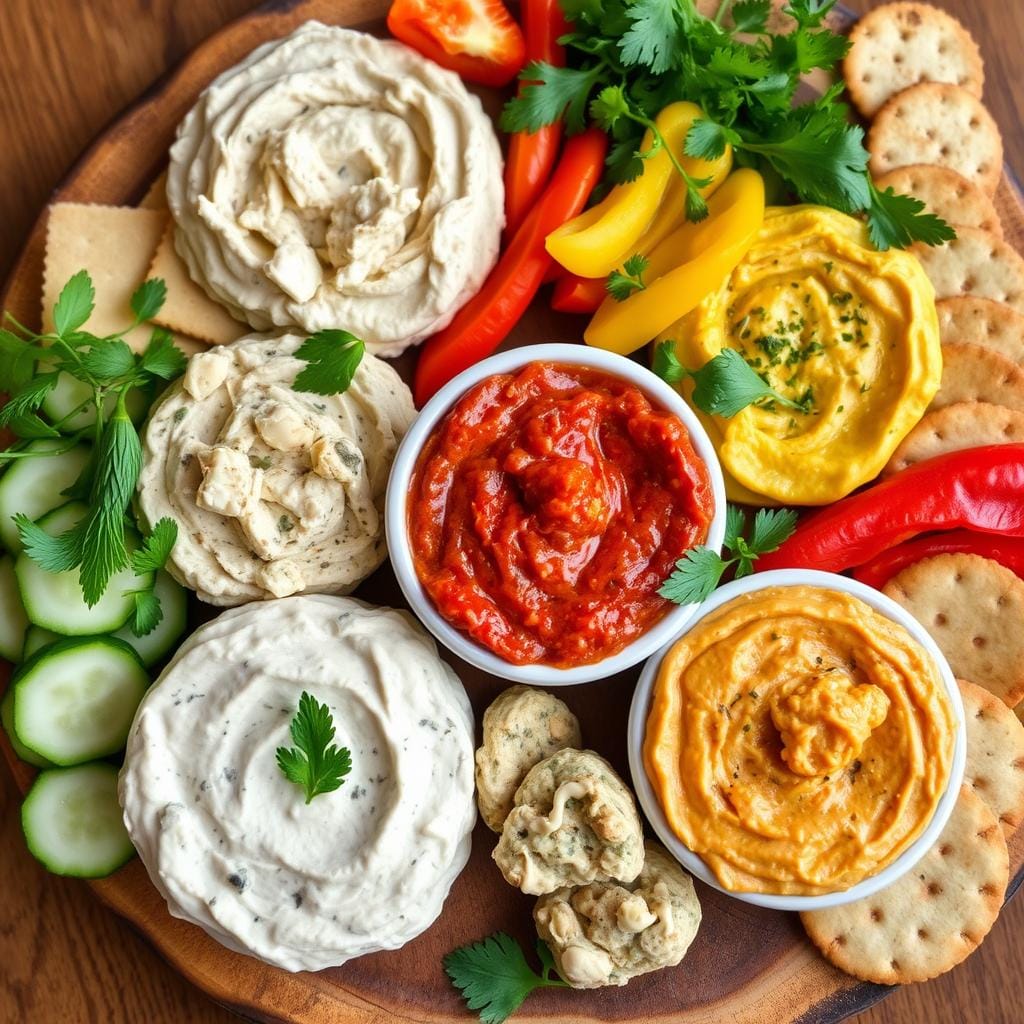
Plant-based cheese spreads have changed a lot. They now come in many flavors, surprising even those who doubt them. From creamy vegetarian recipes to spicy ones, they’re changing our cheese views.
Creamy Vegan Herb Cheese Spread: A Flavor Explosion
My favorite vegan cheese spread uses cashews, nutritional yeast, and fresh herbs. It’s creamy and rivals dairy spreads. Here’s why it’s so special:
- 100% plant-based ingredients
- Protein-packed nutritional profile
- Versatile for multiple culinary uses
Spicy Plant-Based Cheese Dip: Heat Meets Flavor
For a spicy kick, my vegan cheese spread is perfect. It mixes cashews, plant-based milk, and jalapeños for a creamy, exciting dip.
| Flavor Profile | Key Ingredients | Best Used With |
|---|---|---|
| Italian Pesto | Cashews, Basil, Nutritional Yeast | Crackers, Vegetable Sticks |
| Spicy Jalapeño | Cashews, Hot Sauce, Bell Peppers | Tortilla Chips, Nachos |
| Garlic Herb | Almonds, Fresh Herbs, Garlic | Bread, Sandwiches |
“Plant-based cheese spreads are not just a trend, they’re a delicious revolution in cooking!” – Vegan Cuisine Expert
Looking for a vegan cheese spread for a party or snack? These dairy-free options are full of flavor and nutrition. They’re here to stay!
Plant-Based Cheese Recipes for Parties
Hosting a party with vegan options is easy now. I’ve found amazing plant-based recipes that everyone will love. Making a vegan cheese platter is like art, blending taste, creativity, and health.
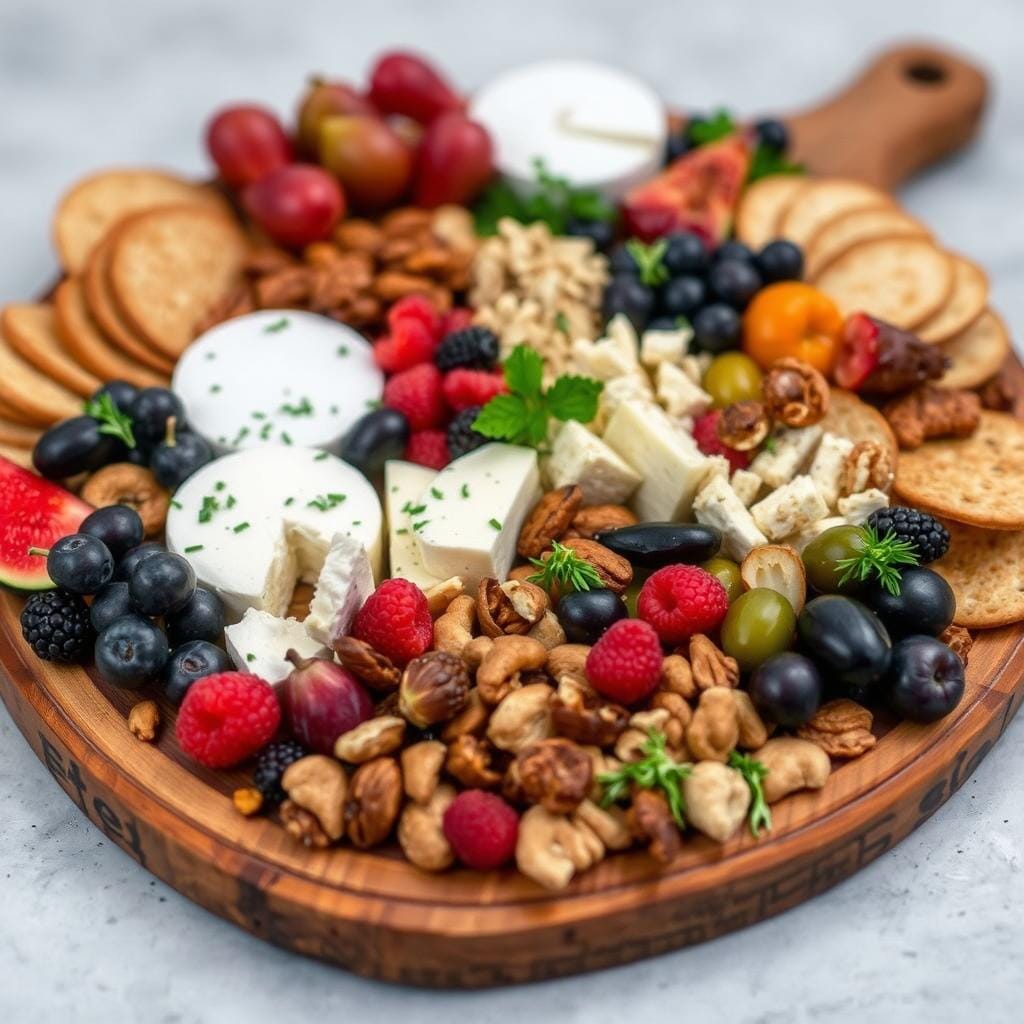
Crafting the Perfect Vegan Cheese Platter
Creating a vegan cheese platter needs creativity and smart choices. I mix textures and tastes for a thrilling spread. Here’s what makes a great vegan cheese platter:
- Spreadable cashew cheese
- Smoked paprika plant-based cheese
- Herbed almond feta
- Fresh fruits, nuts, and artisan crackers
Stuffed Mushrooms with Plant-Based Cheese
Stuffed mushrooms with plant-based cheese are a hit. They’re a favorite plant-based party recipe. They mix creamy cheese with herbs and crunchy breadcrumbs.
| Ingredient | Quantity | Preparation |
|---|---|---|
| Large mushrooms | 12 pieces | Clean and remove stems |
| Plant-based cream cheese | 1/2 cup | Room temperature |
| Garlic | 2 cloves | Minced |
| Fresh herbs | 2 tbsp | Chopped |
| Breadcrumbs | 1/4 cup | Toasted |
Pro tip: Always let your plant-based cheese come to room temperature for maximum flavor and spreadability!
These recipes will make your party unforgettable. Your guests will love the tasty vegan cheese options.
Unique Plant-Based Cheese Alternatives
Exploring new dairy-free cheese options opens up a world of creativity in cooking. Plant-based cheese alternatives have changed how we see traditional dairy. They offer tasty and exciting options for those who don’t eat dairy.
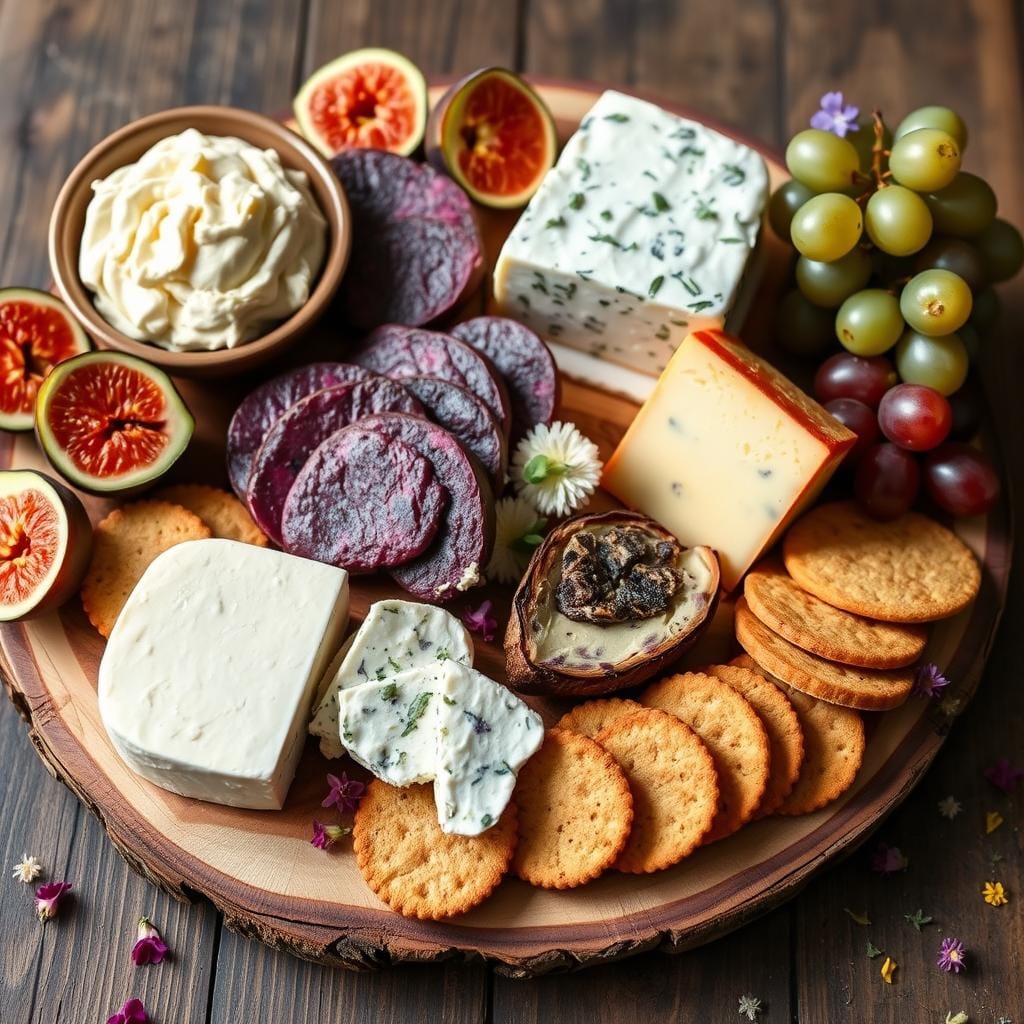
Discovering Coconut Cheese Magic
Coconut cheese is a big deal in the plant-based cheese world. It has a unique texture and taste that’s like traditional cheese. I’ve found that coconut cheese melts well and has a creamy feel that even dairy fans love.
- Ideal for mozzarella-style preparations
- Made from coconut oil and specialized starches
- Creates a smooth, stretchy texture
Unlocking Nutritional Yeast Cheese Flavor
Nutritional yeast is my go-to for real cheese flavor without dairy. It has a rich, nutty taste that makes plant-based dishes pop. The flavor of nutritional yeast adds depth to sauces and is great on popcorn, making recipes more exciting.
“Nutritional yeast is like magic dust that turns ordinary plant-based dishes into culinary masterpieces!” – Plant-Based Chef
Interestingly, over a third of Americans have trouble with lactose intolerance. This makes these alternatives not just tasty but also necessary for many. The plant-based cheese market is growing fast, with new solutions that challenge traditional dairy.
Practical Applications
- Sprinkle nutritional yeast on roasted vegetables
- Use coconut cheese in pizza recipes
- Create creamy sauces with nutritional yeast
Whether you’re looking for dairy-free options for health, environmental, or personal reasons, coconut cheese and nutritional yeast are great. They offer exciting alternatives that don’t lose out on flavor or satisfaction.
Cooking with Plant-Based Cheese
Learning to cook with plant-based cheese can change how you see food. I love trying new things in the kitchen. I’ve found great ways to melt vegan cheese and make tasty dairy-free dishes.
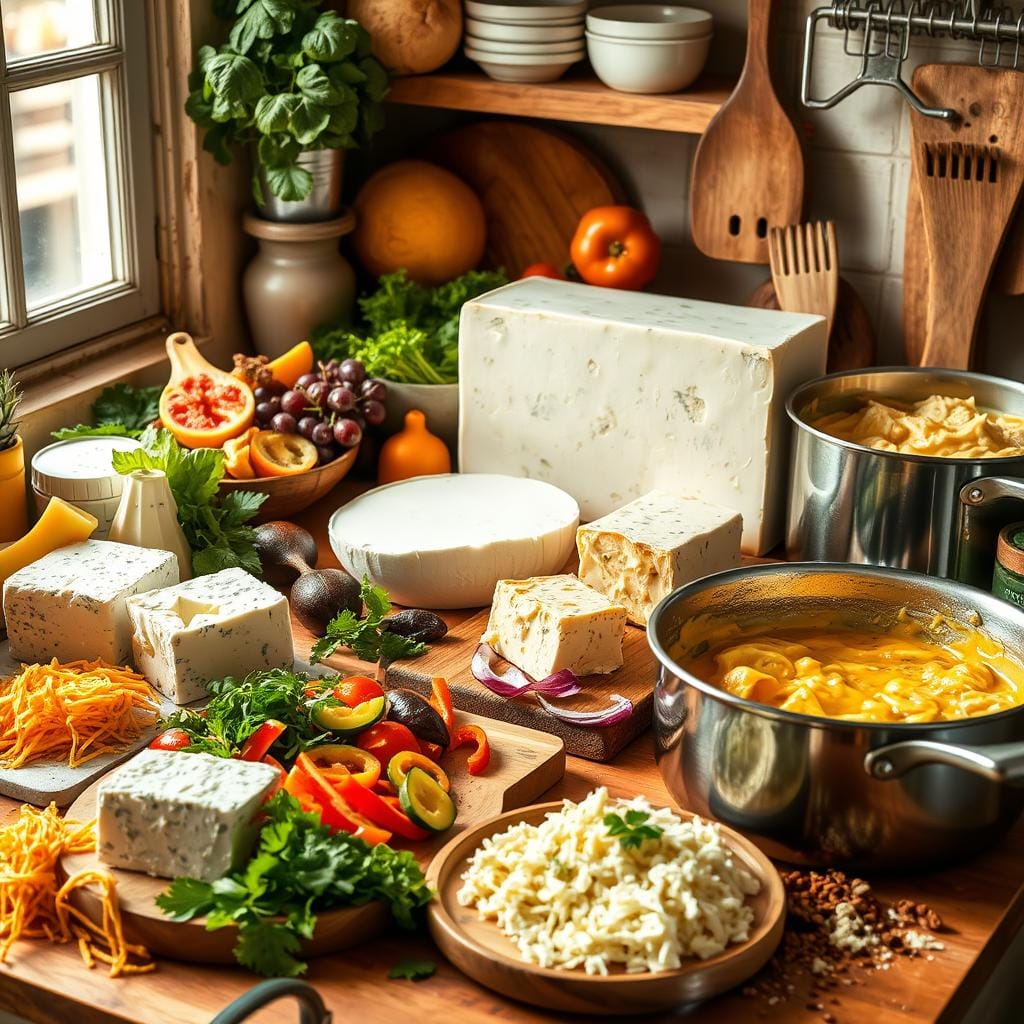
It’s important to know how plant-based cheese works. Not all vegan cheeses melt the same way.
Melting vs. Non-Melting Cheeses
Plant-based cheeses melt differently. Some are better for certain dishes:
- Coconut oil-based cheeses melt well for pizzas
- Nut-based cheeses are great in grilled sandwiches
- Firmer cheeses are perfect for cheese boards
Best Practices for Cooking
Here are my top tips for melting vegan cheese:
- Add melting cheeses towards the end of cooking
- Use low to medium heat to prevent separation
- Try different brands
| Cheese Type | Melting Performance | Best Uses |
|---|---|---|
| Coconut-Based | Excellent | Pizzas, Quesadillas |
| Cashew-Based | Good | Sauces, Lasagna |
| Soy-Based | Moderate | Grilled Sandwiches |
Pro tip: Patience is key when cooking with plant-based cheese!
Remember, practice makes perfect when cooking with plant-based cheese. Each brand and type has its unique melting properties, so don’t be afraid to experiment!
Plant-Based Cheese in International Cuisine
Exploring international flavors with plant-based cheese opens up new culinary possibilities. The global vegan cheese market is growing fast. Innovative chefs are making traditional dishes with dairy-free alternatives that excite our taste buds and respect dietary choices.
My love for global cuisine has shown me amazing ways to use vegan cheese in traditional recipes. The plant-based cheese revolution is changing how we cook internationally.
Vegan Italian Cheese Delights
Italian cuisine is a great place for vegan cheese creativity. I’ve found that cashew-based mozzarella is perfect in classic dishes:
- Caprese salad with cashew mozzarella
- Tofu-based ricotta for lasagna
- Almond ricotta in stuffed shells
Dairy-Free Mexican Dishes
Mexican cuisine offers exciting chances for plant-based cheese alternatives. Cashew-based queso is my favorite for authentic flavors:
- Nachos with spicy cashew queso
- Quesadillas using nutritional yeast cheese sauce
- Enchiladas topped with creamy plant-based cheese
| Cuisine | Vegan Cheese Type | Popular Dish |
|---|---|---|
| Italian | Cashew Mozzarella | Pizza Margherita |
| Mexican | Nutritional Yeast Queso | Loaded Nachos |
“Plant-based cheese allows us to explore global cuisines without compromising on flavor or tradition.” – Vegan Culinary Expert
The global vegan cheese market is expected to hit USD 5.64 billion by 2028. These innovative alternatives are more than a trend. They’re a culinary revolution.
Store-Bought vs. Homemade Plant-Based Cheese
Finding the right vegan cheese can be hard. I’ve tried both homemade and store-bought and found good points in each. This is true in the best vegan cheese brands market.
The choice between homemade and store-bought vegan cheese isn’t simple. Each has its own benefits, fitting different tastes and lifestyles.
Pros and Cons of Homemade Plant-Based Cheese
- Complete control over ingredients
- Customizable flavor profiles
- Lower cost per serving
- Potential drawbacks include time-consuming preparation
Advantages of Store-Bought Vegan Cheese
- Convenient and ready to eat
- Consistent texture and flavor
- Wide variety of options
- Potential higher price point
Recommendations for Best Vegan Cheese Brands
| Brand | Price Range | Customer Rating |
|---|---|---|
| Rebel Cheese | $90-$170 | 4.0-5.0/5.0 |
| Daiya | $4-$7 | 4.2/5.0 |
| Miyoko’s | $6-$9 | 4.5/5.0 |
Pro tip: Think about your cooking needs, budget, and taste when choosing between homemade and store-bought vegan cheese.
“The best vegan cheese is the one that satisfies your culinary desires and nutritional requirements.” – Vegan Cheese Enthuasiast
Ingredient Substitutes for Plant-Based Cheese
Making tasty vegan cheese substitutes needs creativity and knowledge of different ingredients. I love cooking with dairy-free options and have found many ways to make old recipes new again.
Exploring vegan cheese substitutes, I’ve found some key ingredients. They can change your cooking:
- Cashews for creamy textures
- Nutritional yeast for cheesy flavor
- Tapioca starch for stretchy consistency
- Nuts and seeds for complex taste profiles
Adapting Traditional Recipes
Making a dairy-free cheddar recipe is easy. The trick is knowing how plant-based ingredients work together.
Dairy-Free Cheddar Alternatives
My favorite dairy-free cheddar recipe uses simple ingredients for great taste. Here’s a quick look:
| Ingredient | Purpose | Quantity |
|---|---|---|
| Cashews | Creamy base | 1 cup |
| Nutritional Yeast | Cheese flavor | 1/4 cup |
| Turmeric | Color enhancement | 1/2 tsp |
| Paprika | Flavor depth | 1 tsp |
Pro tip: Blend well and play with spices to make your perfect dairy-free cheddar.
“Vegan cheese is not just a substitute, it’s a culinary adventure waiting to be explored.” – Plant-Based Chef
Success in vegan cheese substitutes comes from patience and trying new things. Every recipe is a chance to show off your cooking skills.
Popular Plant-Based Cheese Brands
The world of plant-based cheese has exploded with delicious options. These options satisfy every craving. I’ve explored many vegan alternatives and I’m excited to share insights on two standout brands.
Discovering Daiya Vegan Cheese
Daiya vegan cheese is a game-changer in the plant-based cheese market. Their innovative approach creates dairy-free cheese alternatives that truly capture the essence of traditional cheese. Daiya offers an impressive range of products:
- Shredded cheese varieties
- Cheese slices
- Cheese blocks
- Allergen-free options
Exploring Follow Your Heart Plant-Based Options
Follow Your Heart brings an exceptional approach to vegan cheese products. Their commitment to creating authentic flavors makes them a favorite among plant-based enthusiasts. They offer versatile options that work perfectly in sandwiches and melted dishes.
| Brand | Key Products | Unique Features |
|---|---|---|
| Daiya | Shreds, Slices, Blocks | Allergen-free, Multiple Flavors |
| Follow Your Heart | Vegenaise, Sliced Cheeses | Authentic Flavors, Versatile Uses |
The future of cheese is plant-based, and these brands are leading the delicious revolution!
Whether you’re a long-time vegan or just exploring dairy-free options, Daiya vegan cheese and Follow Your Heart plant-based options offer something for every palate. Their innovative approaches prove that plant-based cheese can be just as satisfying as traditional dairy cheese.
How to Store Plant-Based Cheese
Storing vegan cheese right is key to keeping its taste and freshness. Knowing how to store it can make your favorite dairy-free cheese last longer.
Different vegan cheeses need different storage methods. It’s important to know what each type needs.
Best Practices for Freshness
Here are some must-follow tips for storing vegan cheese:
- Keep unopened packages in the original packaging
- Refrigerate immediately after opening
- Use airtight containers to prevent moisture
- Check expiration dates regularly
Always check the storage instructions for your brand. Each type might have special needs.
Tips for Long-Term Storage
Not all vegan cheeses last the same. Here’s a guide for long-term storage:
| Cheese Type | Refrigerator Shelf Life | Freezer Storage |
|---|---|---|
| Soft Vegan Cheese | 5-7 days | Up to 2 months |
| Hard Vegan Cheese | 2-4 weeks | Up to 3 months |
| Homemade Varieties | 5-7 days | Not recommended |
Pro tip: Wrap frozen vegan cheese tightly in plastic wrap and put it in a freezer bag to avoid freezer burn.
Proper storage is the secret to enjoying delicious plant-based cheese for longer!
Storing vegan cheese right is more than just keeping it fresh. It’s about keeping its quality and taste.
My Personal Favorite Plant-Based Cheese Recipes
I love cooking with plants and have found two amazing recipes. My vegan Alfredo and dairy-free cheese bake are favorites in my kitchen. They prove that plant-based food can be tasty and fulfilling.
My vegan Alfredo sauce is a hit with pasta fans. It’s made with soaked cashews, nutritional yeast, garlic, and lemon juice. This blend creates a smooth sauce that sticks to pasta, making it rich and cozy. I enjoy trying new vegan cheese methods to make my dishes better.
Creamy Vegan Alfredo Sauce
The Sweet Potato and Cauliflower Cheese Bake is my go-to comfort food. It uses roasted veggies and a creamy cashew cheese sauce. This sauce is full of nutritional yeast and spices, making the dish both tasty and healthy.
Sweet Potato and Cauliflower Cheese Bake
These recipes show what plant-based ingredients can do. With a little creativity and whole foods, you can make delicious, cheese-like dishes. They’re not only good for you but also super tasty.
FAQ
What exactly is plant-based cheese?
Is plant-based cheese healthy?
How can I make plant-based cheese at home?
What are the best store-bought vegan cheese brands?
Can I use plant-based cheese in cooking?
How long can I store homemade plant-based cheese?
What are the best nuts for making vegan cheese?
Is nutritional yeast important in plant-based cheese?
Source Links
- Vegan Spreadable Provolone Cheese — Becoming You
- Creamy Vegan Queso
- Vegan cheese | Ethical Consumer
- How to find a healthy dairy or plant-based cheese
- The Best Dairy-Free Cheese, From Shreds to Slices and Crumbles
- Exploring the Health Benefits of Vegan Cheese Alternatives
- Understanding Nutritional Aspects: Vegan Cheese vs. Regular Cheese
- How does plant-based match up versus dairy?
- 16 Vegan Cheese Brands, Ranked Worst To Best – Tasting Table
- 19 Must-Try Vegan Cheese Brands for Cheese Lovers
- Best Vegan Cheese Recipe (Sliceable)
- Best Vegan Mozzarella Cheese (No Oil!)
- How to Make Plant-Based Cheese – Plant-Based with Jeremy
- Explore the World of Vegan Cheese: Varieties & Uses
- Riding the Waves—The Ongoing Evolution of Plant-Based Cheeses Pt 2 | Edlong
- Vegan Cheese vs. Vegetarian Cheese: Key Differences You Need to Know
- Vegan Dips & Spreads | Delicious Plant-Based Dips
- The Best Vegan Queso Dip – Delish Knowledge
- Rebel Cheese
- Best Vegan No-Cheese Sauce
- Homemade Vegan Cheese Slices – Plantifully Based
- Easy Vegan Cheddar Cheese (without nuts)!
- Rebel Cheese
- Vegan cheese that tastes like cheese? These startups may have cracked the code.
- KMCs Plant-Based Cheese Alternatives
- Vegan Cheddar Cheese Recipe (Oil-Free) – Go Eat Green
- Vegan Baked Macaroni and Cheese – The Whole Food Plant Based Cooking Show
- Cheese Alternatives: Latest News 2024 – vegconomist: the vegan business magazine
- Innovation in Plant-Based Foods: The Future of Vegan Cheese
- 5 Dairy-Free Cheeses With Easy-to-Pronounce Ingredients
- Rebel Cheese
- Vegan Parmesan Cheese (nut-free)
- The Dos And Don’ts Of Using Vegan Cheese – Chowhound
- Plant-based retail market overview | GFI
- 21 best vegan cheeses in the UK – tried and tested by vegans
- The best vegan cheeses according to the GHI
- How Long Does Plant-Based Cheese Last? Shelf Life and Storage Explained
- 11 Fridge Must-Haves for Your Vegan Grocery List
- Homemade Vegan Parmesan Cheese!
- Vegan Boursin (Garlic Herb Cream Cheese)
